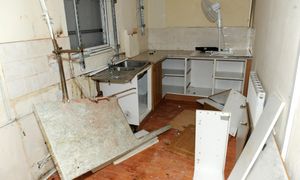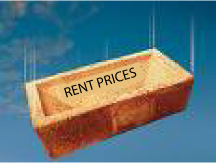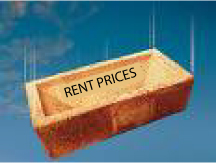Posted by Teresa on December 11, 2012 under Rental Market | 
 The tighter credit standards and falling housing prices that followed the housing bubble’s burst led many Americans to become renters, rather than homeowners. Now the economy is getting stronger, and new households are again forming. But increasingly, young Americans and those burned by foreclosure are opting to rent rather than buy.
The tighter credit standards and falling housing prices that followed the housing bubble’s burst led many Americans to become renters, rather than homeowners. Now the economy is getting stronger, and new households are again forming. But increasingly, young Americans and those burned by foreclosure are opting to rent rather than buy.
Yes, much of the U.S. is in a rental market boom. But in the face of a strengthening housing market, will that trend be continuing? And if rents and demand keep rising, but supply doesn’t keep up, will the pendulum swing back toward home ownership?
Analysts expect that a lack of financing as well as the supply of homes for sale will keep the rental market strong, at least in the short term. However, if rents keep going up and home prices stay relatively stable, your tenants could start checking to see if the grass is greener on the home ownership side of the street.
We are in an uncertain point of the economic recovery. Unemployment is dropping, but it is still above 7.5%. Forty percent of the unemployed have been out of work for six months or more. People don’t buy houses when they’re uncertain about their futures.
Younger people were hit hard by the economic and housing market crash, and baby boomers are retiring in huge numbers. Both of these big demographic groups could keep rental markets strong for years to come.
But once we either avoid or fall over the so-called fiscal cliff, some uncertainty will be abated—for better or worse. And what will happen if lawmakers actually start crafting policy to create jobs? Will a more concrete feel for the future embolden renters to become homeowners again?
If rents keep increasing, home ownership will look better and better—especially as wages stagnate. Many people will simply be unable to afford rising rents and will look for alternatives. Even those stung by foreclosures could buy again, especially when FHA loans become available to them again, three years after their proceedings.
Landlords and property managers, it’s clear that staying on top of what’s happening in your local market is the key to staying ahead of the competition. Adjust your rents and target your tenants accordingly.
Start your tenant relationship off right by knowing who you’re leasing to. Protect your rental property and assets with tenant background checks. Proper tenant screening will ensure you are leasing to the best possible tenants.
Posted by Teresa on February 25, 2012 under Housing Trends | 
 What happens when a bank takes over a rental property after foreclosure? In many cases, they are failing to live up to their legal duties. Tenants and regulators report banks that become landlords are not following local and state housing codes, and tenants often don’t know whom to contact to report problems.
What happens when a bank takes over a rental property after foreclosure? In many cases, they are failing to live up to their legal duties. Tenants and regulators report banks that become landlords are not following local and state housing codes, and tenants often don’t know whom to contact to report problems.
In Oakland, Calif., one tenant reported water leaks so bad that part of the ceiling fell in. Vandals broke windows. And with broken plumbing and exposed electrical wires, the bathroom is too dangerous to use, so he nailed the door shut. The previous owner was renovating the unit when he was foreclosed upon by the bank.
Even more shocking: the bank neglected to pay the water bill for the multi-unit building, so the utility company shut off everyone’s water. The tenant, a single dad with four kids, tried to pay his part, but was refused. With no water in his home, the tenant was compelled to steal one from a vacant home and reinstall it in his.
Another tenant in a bank-owned rental home in Maryland is living with an infestation of bedbugs. After the management company wouldn’t take care of the bedbugs and other problems, she and other tenants tried to find the landlord. They finally did, and were granted a meeting with the finance company who owned the building. Eventually, tenants were successful in getting some of their issues resolved. But the bedbugs remained untreated. Tenants were forced to sue.
Some banks do hire property managers to handle foreclosed properties. But with so many foreclosures being bought and sold, it’s difficult to track who is responsible for what. The problem is so widespread that the U.S. Treasure Department recently warned banks that thy must fulfill their legal duties as landlords.
This is just another example of how the face of housing is changing as a result of the housing bubble and subsequent collapse. States don’t know exactly how to enforce housing codes with banks. Some are drafting guidelines to deal with the problem. In the meantime, honest and professional landlords continue to provide safe housing for their tenants, while many tenants are powerless and living in squalor.
Protect your rental property and assets through tenant background checks. Proper tenant screening will ensure you are leasing to the best possible tenants.
Posted by Teresa on April 13, 2010 under Landlord Tips | 
 Becoming a landlord is not for everyone. A few of the attributes one needs are patience, people skills, and good business practices—and there is still no guarantee it’ll work out.
Becoming a landlord is not for everyone. A few of the attributes one needs are patience, people skills, and good business practices—and there is still no guarantee it’ll work out.
But if you’re thinking about buying your first rental property, the same factors that most landlords consider before diving into the business apply to you, too. Here are a few reasons to consider investing in rental property:
You want a diversified investment portfolio. Ask your financial advisor (preferably a professional, not your brother-in-law!) how rental property would fit into your investment mix. Diversification can help you protect your assets.
You want additional income. Most rental property owners are middle-class working people who decide another income source would be beneficial. It takes time to manage a rental property business, but you can do it part time and keep your day job. And who knows? If you’re successful, you can always work into making your rental business a full-time venture.
There are tax advantages. Again, check with your tax professional, but real estate is one of the most favored investments, tax-wise. A few benefits are deductible expenses, depreciation write-offs, and favorable capital gains tax rates. Writing off depreciation alone can offer a large tax break against annual cash flow.
In the long run, real estate holds value. Despite the housing bubble the US recently experienced, depreciating home values and foreclosures, over the long term, rental properties have held their value through all the boom and bust housing market cycles. Of course every business has up periods and down periods, and rental property is no exception. Think long term, and be cautious.
Investing in rental property can help you in retirement. Done well, and with a thought-out strategy, real estate investment can augment your retirement fund. As with any investment, the earlier you begin, the better your results will be. Think about holding properties for 20—30 years, not 5. Think tortoise—not hare—when it comes to making decisions about rental property as an investment.
The contents of this article are intended for general information purposes only, and should not be relied upon as a substitute for obtaining tax advice applicable to your situation.
Posted by Teresa on April 10, 2010 under Housing Trends, Landlord and Tenant FAQs, Landlord Tips | 
 In 2007, the U.S. Census Bureau reported 62% of U.S. households used the Internet in their home. That’s an enormous increase from 18% in 1997, the first year Internet use was tracked. 82% of those users reported having high-speed access, and 17% reported use of a dial-up connection. By October, 2009, some reports stated that Internet-using households in the U.S. increased to 69%.
In 2007, the U.S. Census Bureau reported 62% of U.S. households used the Internet in their home. That’s an enormous increase from 18% in 1997, the first year Internet use was tracked. 82% of those users reported having high-speed access, and 17% reported use of a dial-up connection. By October, 2009, some reports stated that Internet-using households in the U.S. increased to 69%.
It’s clear that the majority of American households use the Internet. And, the majority of those users have high-speed access. Demand has been overwhelmingly established. The only question is who pays for it?
Free Internet service is a common tenant perk. In some areas, it’s a given that a rental condo or apartment will come with free Internet—even though it might be bundled into the rent. In other markets, tenants are expected to pay for all of their utilities themselves—including Internet service.
And even though the first quarter apartment rent report showed promising results in some markets, things are still tough in the rental property business. Plenty of competition means owners continue to create incentives to attract good tenants. Is providing Internet service a good move?
Look at your market. Survey Craigslist.org and other online listing services for rental housing offers in your category. If the majority of single-family rentals do not brag about free Internet, you might need to provide it in yours. But, if you own an apartment building near your local college campus, and everyone else in the For Rent category is offering free Internet, you might have just found the reason your rentals are not filling up fast enough.
Check with your local Internet service provider about the cost of wireless service. Modem leases and monthly charges vary. Ask about security, too—especially if you have a duplex or multi-family housing situation. You don’t want a situation where tenants are vulnerable to stolen information—and you don’t want to provide free Internet to the entire neighborhood! Your ISP should be able to set up a secure system for your rental units quickly.
Whether you pass the cost along to your tenants or not probably depends on the cost, right? Still, hearing “free Internet” might be the tipping point that makes a potential tenant a year-long lease-signing tenant. And if you’re in need of some more of those, you might want to at least consider providing free Internet.
Posted by Teresa on April 6, 2010 under General | 
 U.S. apartment rents rose from the fourth quarter of 2009 to the first quarter of 2010, by a tiny 0.1% for asking rents and 0.3% for effective rents. This is the first quarterly effective rent increase since the third quarter of 2008, according to a Reis, Inc. report released today. When effective rents (which include perks like free rent and utilities) increase, it suggests that landlords are actually making fewer concessions to tenants—and they are paying off.
U.S. apartment rents rose from the fourth quarter of 2009 to the first quarter of 2010, by a tiny 0.1% for asking rents and 0.3% for effective rents. This is the first quarterly effective rent increase since the third quarter of 2008, according to a Reis, Inc. report released today. When effective rents (which include perks like free rent and utilities) increase, it suggests that landlords are actually making fewer concessions to tenants—and they are paying off.
While effective rent was up from the previous quarter, it was still down 2.3% compared to the first quarter of 2009. However, that’s much better than the 5.6% decline we saw from 2008’s to 2009’s first quarter. This dramatic change indicates a reversal in rent decreases.
Strong markets that saw rent increases include Miami, New York City (the most competitive apartment market in the U.S.), Colorado Springs, Washington, DC, San Antonio, and Dayton, OH. Continued struggles were seen with lowered year-over-year rents in Las Vegas, San Jose, and San Francisco.
In Miami, effective rents for the first quarter gained 1.6% to $1,008 per month, and in New York, the gain was 0.9%, to $2,667 per month.
Vacancy rates remained unchanged—at the record level of 8%—during the first quarter. However, no increase can a sign the market is at or approaching the bottom of the vacancy pit and recovery is on the horizon. In New York City, vacancies even fell 0.1% to 2.8% from the previous quarter.
What about new construction? Well, 22,000 new apartment units opened in 2010’s first quarter, and their vacancy rate was a whopping 52.8%. And in 30 of the 79 markets studied, vacancies rose. But large investors are again looking at developing apartment properties—perhaps anticipating increased demand for next year.
Looking at the overall 1st quarter picture, it’s much brighter than reports were throughout 2009, so it’s possible that the apartment market will be on its way to recovery this year—as long as the economy picks up some steam, and some jobs.
Pre-screen all tenants as part of your standard application process. Background and credit checks will help ensure you rent to qualified tenants. For more landlord resources, including forms and information on tenant screening, turn to E-Renter.com.
Posted by Teresa on March 17, 2010 under Housing Trends | 
The National Association of Home Builders recently released its Multifamily Housing Market Index for the 4th Quarter 2009. The Index shows a dampening of enthusiasm among those polled, to say the least.
At the time the data was complied, rental housing vacancies were expected to continue increasing, as was supply. Asking rent dropped from the 3rd quarter, but effective rents rose slightly over the same period.
Another troubling figure from the report is Percent of New Apartments Rented within 90 days, which dropped from 45.8 in the 3rd quarter to 34.1 in the 4th.
However, a positive note is seen in the increase in volume of calls from prospective renters. That figure was 8 points higher than in Q3 2009 and 6 points higher than Q2 2009.
What does all this mean for rental property owners and managers? Well, if you are sitting on brand new apartments, you will likely need to work harder than before to get them rented. But that doesn’t mean your phone isn’t ringing at all—in fact, the index shows a healthy increase in Prospective Renter call volume.
Perhaps more amenities, rent concessions, or lower rent will continue to be required to fill these vacant properties. Are callers finding a better deal in single-family rentals? Are they staying home with mom and dad rather than move into their own apartment? Or do renters continue to double- and triple-up with their friends, waiting to see what happens with rents?
Whatever is going on in renters’ minds, the message is clear: the multifamily rental market is expected to stay soft—and painful for those who are in it—at least for the foreseeable future. Stay tuned for more fascinating facts and figures as they are reported!
Posted by Teresa on March 31, 2009 under Housing Trends, Landlord Tips, Tenant Credit Checks | 

Falling Prices no Cause for Panic
The heated rental market of the past few years is definitely over. Rent increases followed housing price increases to unsustainable levels. Reports from around the country show that rents continue to fall.
In New York City, the biggest drop, 8% over last year, was in the category of studio apartments in doorman buildings. In a city like New York, where rents are excessively high when compared to the rest of the country, that’s significant. Renters in NYC are used to numbers like $3,395 for one-bedroom apartments with a doorman (but you can lose the doorman and pay only $2,632). It’s a tough, competitive market—but people are finding more rental deals than ever right now.
Renters who signed leases at the height of the bubble are more interested in investigating their alternatives—including moving—than before. Most folks are not willing to pay more, but they are looking for—and finding—similar properties for less money.
Other renters are downgrading to cheaper properties just to save money. With job security at a new low for many working people, the opportunity to save several hundred dollars a month only makes sense. Thrift is in, and the ability to sock away money in savings appeals to people who never considered it before.
What could this mean to landlords and property managers? Expect to work a little harder to secure and keep good tenants. It’s a renter’s market, but there are still good, solid tenants looking for rental properties. Make sure your property is in top condition and advertise it well.
In this market, current tenants might ask for rent reductions at lease renewal time. To avoid reducing the rent, think creatively of other ways to keep them. Perhaps you can pay for certain utilities, or upgrade the cable package. If you have a vacancy elsewhere, upgrade a good tenant to a nicer property. A fresh coat of paint or new carpet could be perks a tenant would stay for.
Some landlords, desperate to keep properties filled, are accepting tenants with bad credit. This “I’ll take anyone” approach is a mistake. Tenants with bad credit could cost you much more money over time than you’ll lose by waiting for a solid tenant. And in this economy, a low credit score is likely to get worse, not better. There is no better time to thoroughly check your prospective tenants’ backgrounds and credit histories.
The rental market will swing back up again. Rents are often tied to jobs, and when job numbers increase again, look for signs that rents are on the increase. Until then, be patient, don’t panic, and plan carefully. Consider new ways to keep your properties leased; be open minded to new ideas and to all requests from your tenants. But remember, you are under no obligation to let tenants out of a binding lease, just because they can rent somewhere else for less.
For more landlord resources, including everything you need to know about
tenant screening, turn to
E-Renter.com. You’ll know that you have the best possible tenants when you
prescreen.
 The tighter credit standards and falling housing prices that followed the housing bubble’s burst led many Americans to become renters, rather than homeowners. Now the economy is getting stronger, and new households are again forming. But increasingly, young Americans and those burned by foreclosure are opting to rent rather than buy.
The tighter credit standards and falling housing prices that followed the housing bubble’s burst led many Americans to become renters, rather than homeowners. Now the economy is getting stronger, and new households are again forming. But increasingly, young Americans and those burned by foreclosure are opting to rent rather than buy.





